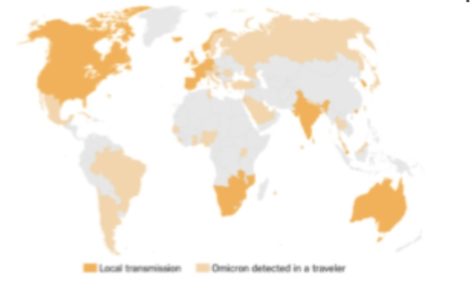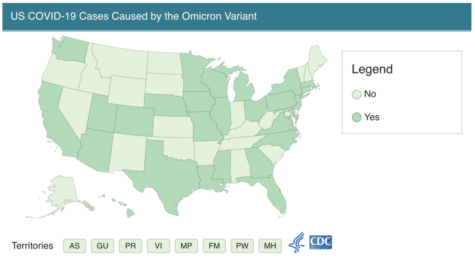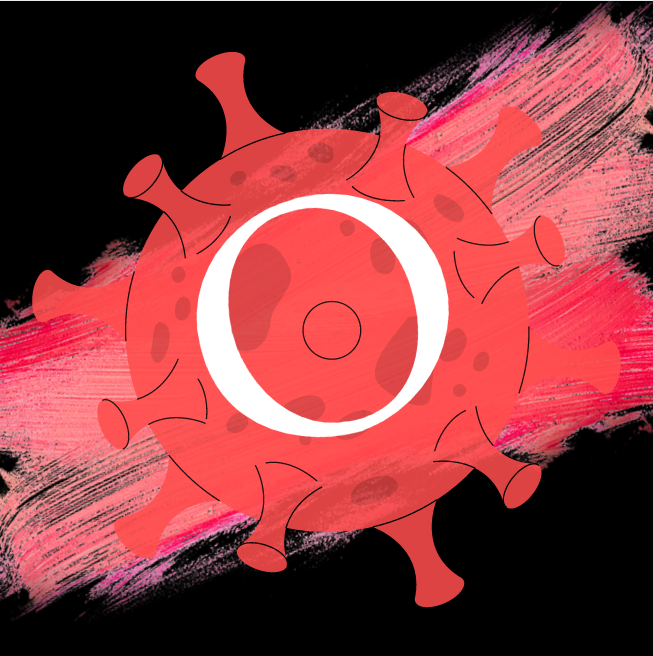Omicron: What you need to know
*note, this article was written December 12, 2021, so writing is accurate for its time
“Ο” is an omicron. It’s the 15th letter of the Greek alphabet. It’s also the name of the latest of the deadly COVID-19 variants. Originally discovered in South Africa in late November, it’s spread to dozens of countries with at least 100 cases around the globe.
The Omicron variant of COVID-19 is the latest in the variants, causing a scare around the globe. Some countries, such as Morocco, Japan and Israel, have closed international travel altogether, while New York has brought back its mask mandates.
While California hasn’t brought back any new safety measures regarding the variant in place, the threat of the virus and its latest variant still looms throughout the state, however, the state has said that they will increase testing in airports, especially for returning travelers from Zimbabwe, South Africa, and Botswana, Namibia, Lesotho, Eswatini, Mozambique, and Malawi.
Both the CDC and California Department of Public Health (CDPH) recommend continuing the following basic COVID-19 safety procedures:
- Wearing a mask
- Washing your hands
- Get tested
- Getting vaccinated
- Getting the booster shot if eligible
- Staying home if you’re sick

California has documented at least 19 cases of the Omicron variant, with 17 of them confirmed to have been vaccinated (the other 2 vaccination statuses are unknown). 6 of those cases have been reported in Alameda County. Only 1 patient out of those 19 had to be hospitalized and no deaths have occurred yet. In the United states, there are at least 43 cases of the new variant, with most of those infected being fully vaccinated younger adults. Only about ⅓ of those infected were recent travellers, meaning local transmission has begun.
Because the variant is so new, the lack of data makes it hard to identify the symptoms and lasting effects.
“We do not know at this time if this new variant causes more severe COVID-19 illness than other variants or how it might impact response to treatment”, the CDHP said in their statement on December 1st.
Data from an Israeli study conducted by the Sheba Medical Center and the Health Ministry’s Central Virology Laboratory has found that those who got their second dose of the COVID-19 vaccination 5-6 months ago have little neutralization against the Omicron variant, but they do have it against the Delta variant. However, those who got their booster shot did have neutralization abilities against the Omicron, but not as much as the Delta one.
“The good news is that with the booster dose it increases about a hundred fold. There is a significant protection of the booster dose. It is lower than the neutralization ability against the Delta, about four times lower” said the director of the Infectious Diseases Unit at Sheba, Gili Regev-Yochay, to Reuters.

In addition to the fact that Omicron may bypass vaccines, it also might be able to spread quicker. Experts do say that it’s too early to tell exactly how fast and well the new variant spreads, but recent data has shown that Omicron might spread faster than the Delta variant, which is the fastest spreading known variant of COVID-19. This poses Omicron as a potentially serious threat if these hypotheses are true.
Many people who have contacted the variant did not experience serious symptoms, however, many of these people were also young adults, so there is no viable proof yet to see if the variant is less dangerous than others.
The best protection against the Omicron variant so far, as said by the CDC, is to get fully vaccinated with booster shots if eligible.
“Everyone 5 years and older protect themselves from COVID-19 by getting fully vaccinated,” the CDC website says. “Everyone that’s age 18 and older should get a booster shot at least two months after their initial J&J/Janssen vaccine or six months after completing their primary COVID-19 vaccination series of Pfizer-BioNTech or Moderna.”
Visit vaccines.gov to see how to get a vaccination and booster shot
Your donation will support the student journalists of Dublin High School. Your contribution will allow us to purchase equipment and cover our annual website hosting costs.



































